Menu
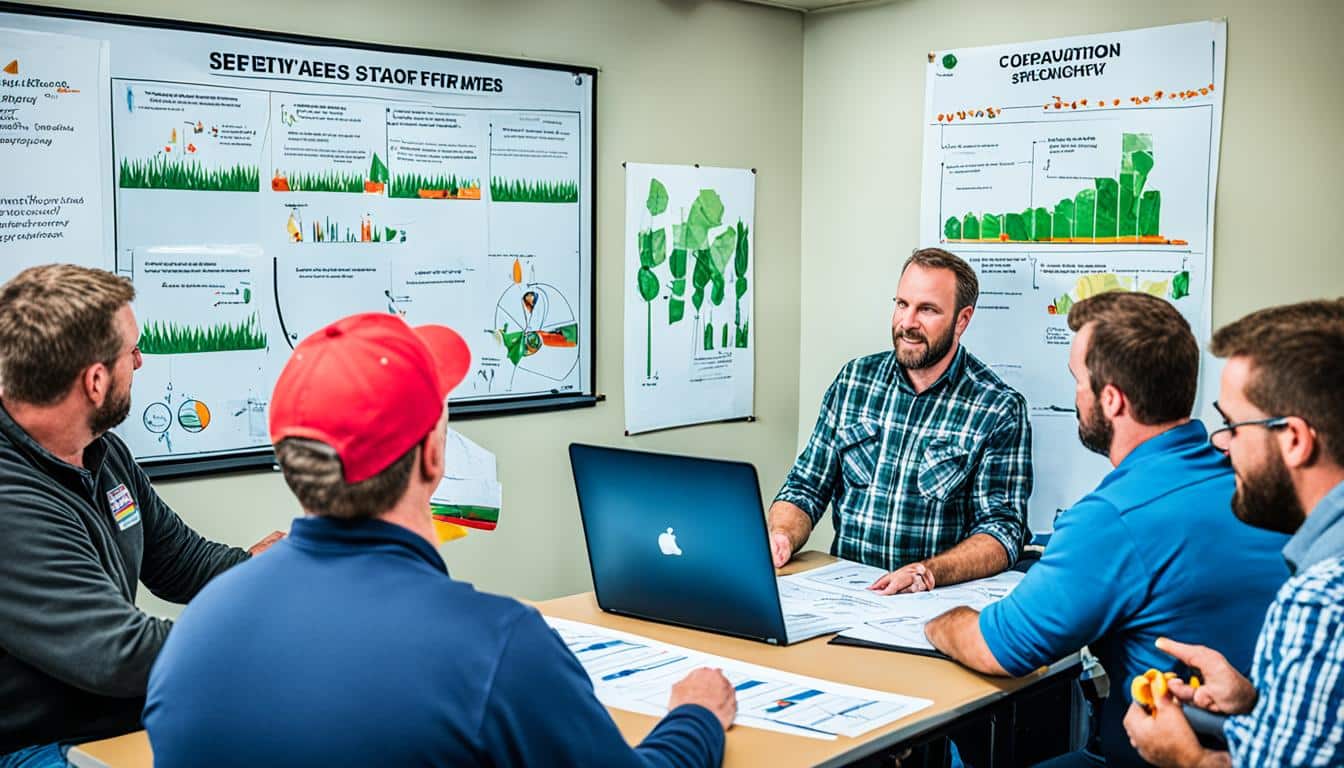
Despite the many safety training programs available, why do farmers still face life-threatening risks? Farming is risky due to the nature of its activities. Thus, it is crucial to boost safety in agriculture through training. These programs help farmers follow safety rules, handle emergencies, and create safe work areas. Focus on strict safety measures can reduce dangers for farm workers and keep farming sustainable.
Farm safety training is crucial for keeping farmers and farm workers safe. Unfortunately, farms are among the most dangerous places to work, with many accidents leading to deaths or serious injuries. Teaching people who work on farms about safety through courses and programmes can greatly decrease these risks.
Lessons are key to avoiding accidents on farms. Tailgate training is an excellent way to teach vital skills in an easy, direct manner. These sessions are best for 5 to 10 people and should be short, just 15 minutes focusing on one or two important points. They can happen weekly or biweekly, making safety a regular part of farm work. It’s essential to cover topics that reflect recent accidents and listen to what the workers suggest so that the training meets their needs.
Good farm safety not only reduces accidents but also brings big savings and a happier community. Programs teaching how to use chemicals safely cut down on chemical-related sickness and costs. Such efforts improve overall farm safety, reducing the chances of costly accidents and health problems. They also make everyone more committed and productive, showing that knowledge about safety benefits both individuals and the community.
Learning to handle farm equipment safely is very important. Devices like Power Take-Off (PTO) are extremely risky without the right training. Old tractors can be dangerous too, but adding safety features is worthwhile, even if it’s expensive. Plus, it’s critical to prevent risky scenarios like getting stuck in grain bins by using the right safety gear and procedures. Finally, being careful around animals, especially bulls, and having clear escape plans involve practical training that’s tailored to each farm’s unique setup.
Farm safety training is varied, aiming to help everyone in farming. There are on-site and online courses for easy learning.
On-site training is hands-on, perfect for those who learn by doing. It’s focused on what the farm needs, making it very practical. NYCAMH’s Farm Emergency Response Program is a great example. It teaches fire safety and more, for free in New York. It also helps with respirator fit tests and educates kids in farming areas.
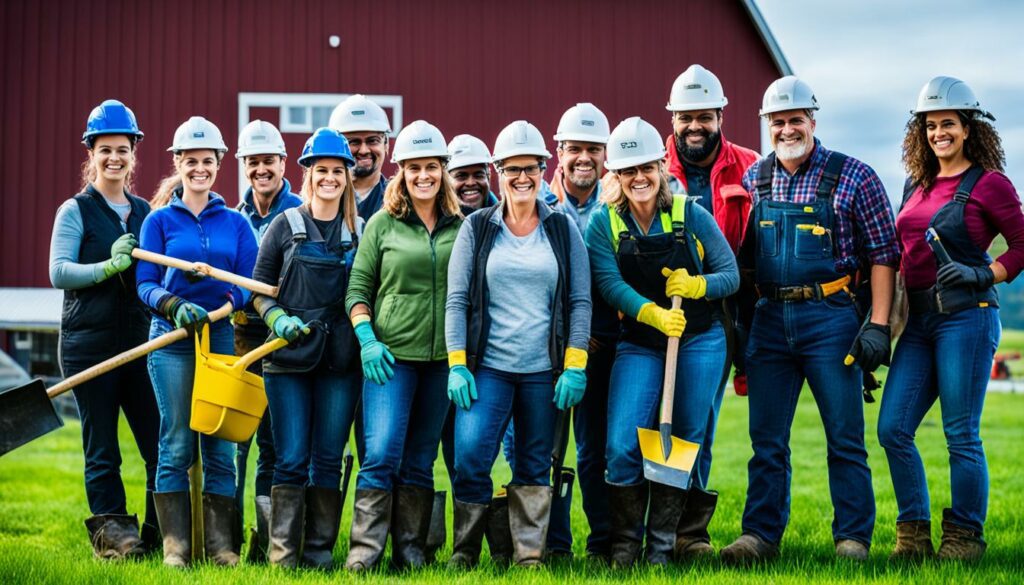
Online training is for those who need to learn on their own time. It covers broad farm safety topics, like using chemicals safely. NYCAMH has FDA-approved courses. These meet standards for handling produce safely.
Both on-site and online training are crucial for farm safety. They help lessen dangers and make farms safer and more efficient.
Farms use many types of machinery. These machines are key for getting work done but can also be very dangerous. That’s why special agricultural safety training is so important. It teaches farm workers how to use machinery safely. They learn proper ways to use, take care of, and stay safe with the machines.
Tractors cause a lot of farm accidents. Sadly, some of these accidents are fatal. This is why tractor safety training is a crucial part of agricultural safety training. A great example is the Hazardous Occupations Safety Training in Agriculture (HOSTA) course. This course is a must for 14- and 15-year-olds working on farms that aren’t their family’s. It costs just $15 and makes sure young tractor operators know how to be safe.
| Location | Date | Time | Registration Deadline |
|---|---|---|---|
| Hill City | April 22 | 8:00 AM | April 18 |
| Russell | April 22 | 8:15 AM | April 14 |
| Beloit | April 29 | 8:00 AM | April 25 |
| Salina | May 25 | 8:00 AM | May 20 |
Operating big machines like combine harvesters and balers needs special skills. A big part of staying safe is knowing how to look after the equipment, use it correctly, and act fast in emergencies. These courses are full and cover everything you need to know. Plus, they let people try out what they’ve learned with experts watching. Because using these machines can be really risky, this part of agricultural safety training is absolutely vital for saving lives on the farm.
Having good agricultural safety training is key to keeping farms safe and running well. The agricultural sector has a high fatal injury rate. Thus, it’s crucial to teach farmers and workers about safety through well-structured programs. These programs aim to prepare everyone to prevent accidents and handle risks wisely.
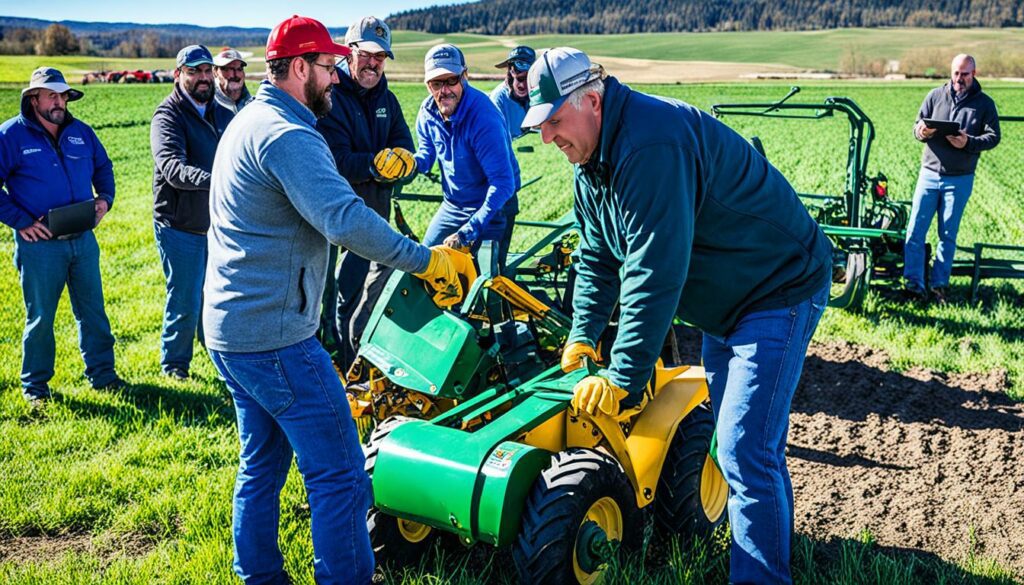
Learning proper field practices is a big part of farm safety training programs. This includes teaching Hazard Communication, Emergency Action and Fire Prevention Plans, and Industrial Hygiene. Such practices help cut down the chance of accidents and deaths in farming. The agricultural industry sees a high rate of fatal injuries. This makes learning these safety measures extremely important.
Properly maintaining and using equipment is vital for farm safety. Courses like OSH Professional and Train-the-Trainer are crucial. They focus on the right ways to use and look after equipment. Since transportation incidents cause a lot of fatalities, machinery safety training is very important. These courses also go over Electrical Safety, which is essential for using electric tools safely.
Getting the right training on chemicals is very important to keep farm workers safe and healthy. This is because working on farms is a very dangerous job. Each year, 20 out of every 100,000 full-time farm workers die. This is much higher than the general U.S. work rate of 3.6 deaths.
Safety workshops on farms are incredibly valuable. They teach workers how to safely handle pesticides and fertilisers. These sessions help avoid accidents when moving chemicals or using them. They also protect against long-term health issues like lung problems and skin diseases caused by chemicals.
Proper training covers using pesticides safely. Workers learn the right ways to put them on crops, how to use protective gear, and what to do in an emergency. This helps stop pollution and lowers the chances of getting sick from chemicals.
Learning about fertiliser safety is also key. Workers are taught how to handle and put on fertilisers without accidents. They get to see demonstrations and follow clear rules. This makes the farm a safer place for everyone.
| Training Program | Focus | Languages | Cost |
|---|---|---|---|
| NYCAMH Farm Safety Trainings | Various topics including pesticide and fertiliser safety | English, Spanish | Little to no cost |
| Farm Emergency Response Program | Fire safety, emergency preparedness, and first aid | English, Spanish | No cost |
| Respirator Fit Testing Program | Proper use and maintenance of respirators | English, Spanish | Discounted PPE for purchase |
Taking part in these safety programs makes farm workers ready to handle chemicals safely. It improves safety and makes farms more sustainable.
Creating a proactive safety culture on the farm is key. Specialised workshops are designed for all levels of agricultural workers. They mix theory with hands-on learning. This approach gives a full view of how farm safety works.
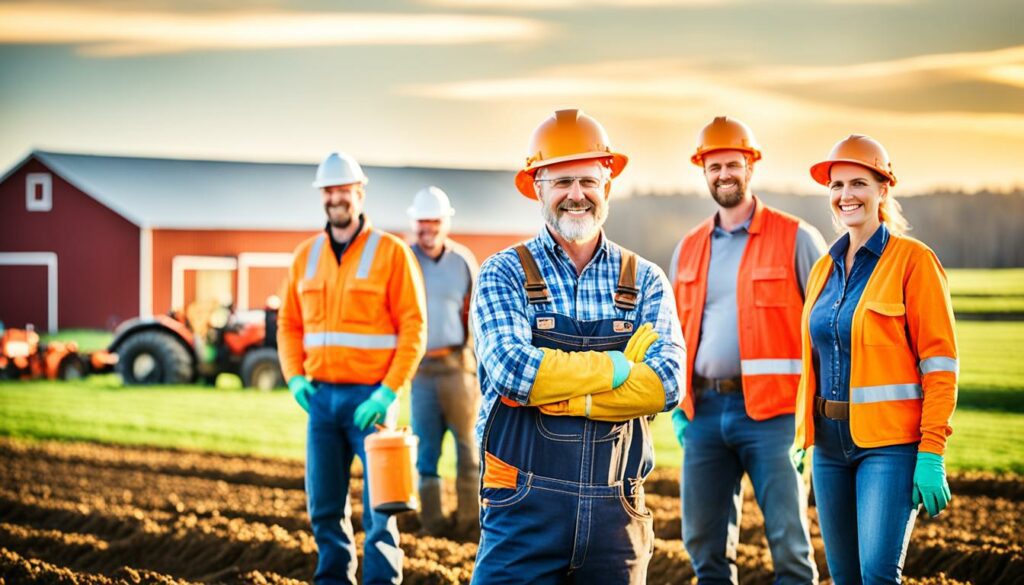
Newcomers to farming learn the basics in these workshops. They cover things like using safety gear, fighting fires safely, and spotting dangers. Each topic is kept short, around 15 minutes, and group sizes are small. Meeting in the evenings boosts learning and interest.
Experienced farm hands and managers get into deeper safety issues. They study emergency plans, staying safe around electricity, and how to lead a safe farm. These sessions use a casual approach for better discussion. Huddling weekly or twice a month keeps the safety ideas fresh. This helps cut down on accidents at work.
Adding these workshops to farm safety plans cuts down on risks. Fewer accidents and safer routines are the aims. The end goal is a workplace where everyone feels safe and valued. This way, the farm becomes a better, more efficient place to work.
Rural areas can be dangerous, so it’s vital to keep farm families safe. This is even more important because kids often help out on the farm. Making sure everyone is safe teaches them to be responsible and cautious. It also reduces the dangers of farming.
Keeping kids safe on farms is a big part of rural safety teaching. Safety Days and other events show them how to act safely, what to do in emergencies, and how to look after themselves both on the farm and at home.
NYCAMH runs activities specifically for young farm workers. They learn about machine safety, how to stay safe while working, handling chemicals, and dealing with animals. These activities are free. The Carle Rural Health & Farm Safety Webinar series covers even more, like how to safely handle grain and drive ATVs and UTVs.
Getting the whole family involved in safety is key. These methods aim to educate everyone and work together to manage risks. NYCAMH offers free surveys and training that meet national safety standards, in both English and Spanish. This makes them broadly available.
There’s also the Farm Emergency Response Program for fire safety, getting ready for emergencies, and first aid made for farm families. Fit Testing Programs help with wearing and keeping respirators safe, as required by law every year. These efforts ensure everyone is protected through trusted safety measures.
Certification programs are key in checking if safety practices are learned in farming. They are backed by important bodies like the FDA. Farming business becomes more trustworthy with such certifications. They mean farms are following all the right safety steps meticulously. This assurance is precious. It helps farms meet high safety standards and be ready for checks.
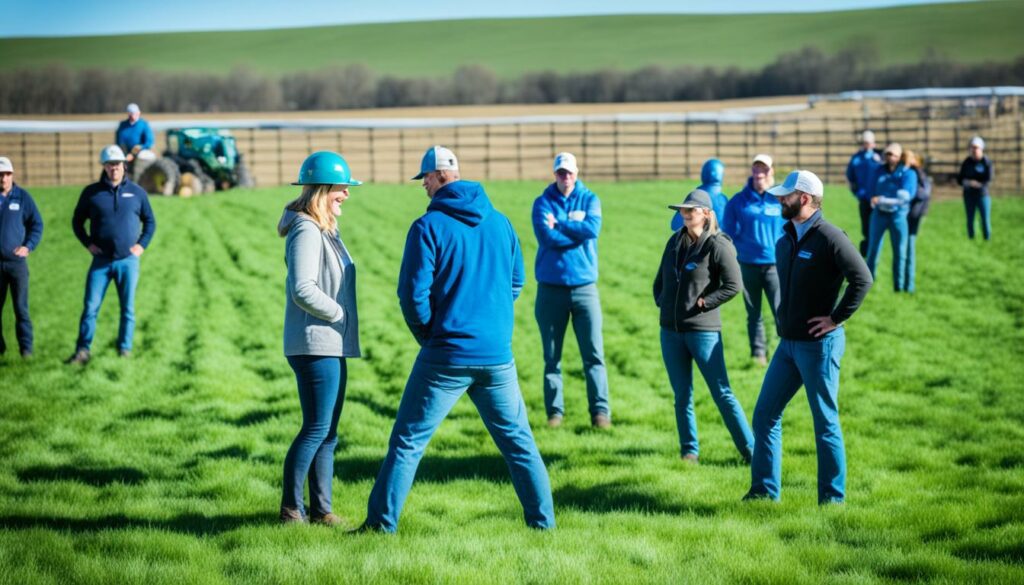
FDA has OK’d certain farm safety courses. They keep safety levels high on farms. These courses teach the right safety ways to make farm accidents less. Central to these classes is a tough test. Students must ace a 50-question written test. Plus, an operational skills check and a pre-op/driving test. This hard exam ensures only those who really know farm safety get certified.
Getting certifications known in the industry is good for farms. It shows the farm is serious about top safety. Certifications like those from NSTMOP mean going through 24 hours of lessons. These cover vital safety and tractor skills. Such certifications boost a person’s skills and make the whole farm safer.
These certifications can also cut costs for farms, like lower insurance. They help in decreasing farm stoppages and accident losses. Programs like Gear Up for Ag Health and Safety™ are there for post-secondary students. They offer exciting lessons and protective gear. These initiatives highlight the worth of sticking to known safety rules. This helps make work areas safer and more efficient.
“The Progressive Agriculture Safety Days® funded by the Progressive Ag Foundation is a prime example, offering extensive resources to children across North America, ensuring that future generations are well-versed in safety practices.”
Farm health and safety programs are vital for disabled farmers. They ensure these farmers can work safely and effectively. Projects like AgrAbility offer custom assessments and use new technology to help.
The AgrAbility project has grown. Now, over 20 State and Regional AgrAbility Projects are helping farmers and ranchers with disabilities. Since 2009, they’ve supported more than 3,500 people in Wisconsin alone. Thanks to this expansive network, farmers with disabilities can access the training they need to stay safe.
Using assistive technology is a big part of these efforts. For example, RF-DASH has taught over 80 firefighters and EMTs about farm safety. They then pass that knowledge on to disabled farmers. Many states also have programs to help buy needed technology. This technology helps adapt farm tools and methods for disabled farmers, making agriculture safer and more open to everyone.
By starting community-based farm safety projects, different farm areas can make use of custom-made tools and teamwork to boost safety. These projects bring together local people, allowing for shared lessons and help, making farms safer and a community effort.
A key project works to make farms safer by focusing on women as leaders in their families. The effort is funded by safety groups and aims to teach kids and adults about staying safe. It hopes these early lessons will stick for a lifetime.
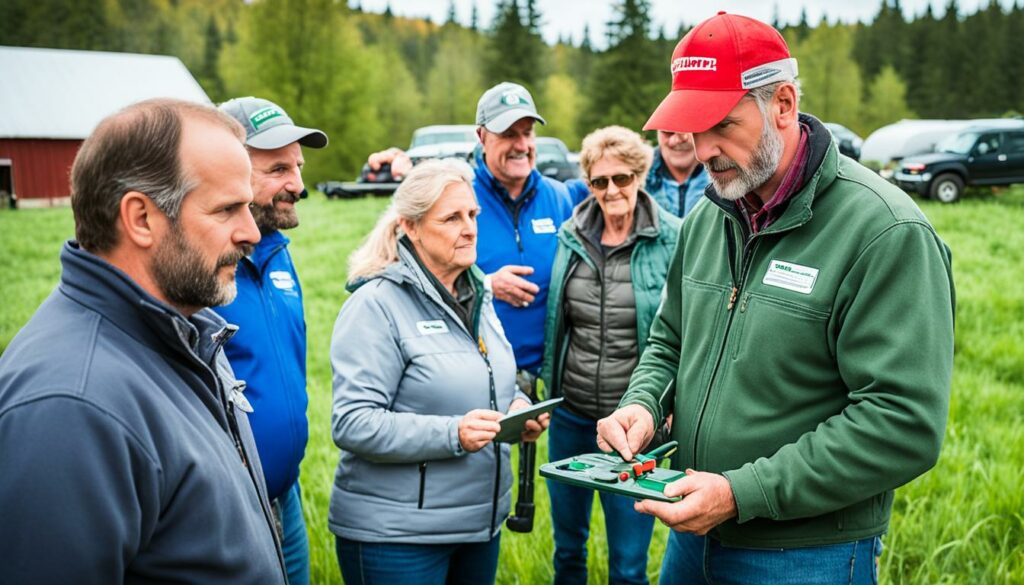
They want to make farming safer for children, lowering the chances of them getting hurt or sick. The project is very important, especially in places like central Illinois, where farm dangers are too common.
Local online workshops talk about many farm safety topics, like operating machinery and looking after animals. Plus, if you join in on three classes, you get a free safety kit to protect yourself.
Thanks to local groups, east central Illinois farms get free emergency supplies. The training they offer teaches people how to help in farm accidents to avoid deaths, especially that of children.
Mental health first aid classes help farming communities spot and help with mental health troubles. They also focus on helping farmers handle stress better, a key part of staying healthy.
In 2024, the Farm Safety Outreach says they’ll train more farm workers in safety. They want to teach groups in specific areas more about safety, hoping to make food work safer for everyone.
The training involves things like water and soil testing, ensuring food handling is safe. They’re keen to help groups that often miss out on these lessons. And they aim to make new safety programs that reach more people.
Projects to improve writing grant requests will help groups that need more support get the funds they need. They also have extra support for those who team up with others to help minorities better.
The Farm Safety Outreach Program has online help and guidance to make applying for their help easier. This is to get more people, especially farmers in need, to join in and become safer.
Distance learning has changed how farm safety education is accessed. With online agricultural safety training, farmers worldwide can join important safety courses without travelling. This makes safety knowledge more widespread and encourages safer farming everywhere.
Take the FarmResponse course for $150 and earn 3.5 CE credits. It’s great for healthcare pros in places like Connecticut and Virginia, who might get it for free. You could also earn 0.35 CEUs from the Midwest Center for Occupational Health and Safety. This applies to many professionals, including Industrial Hygienists and Certified Safety Professionals.
FarmResponse offers 3.5 AMA PRA Category 1 Credit(s)™ and 3.5 hours of CORE training for Georgia LPCCs. It includes 3.5 CE credits for Louisiana Occupational Therapists. This strong accreditation shows the course’s focus on teaching professionals how to ensure farm safety.
Accidents with tractors are a big part of farm injuries and deaths. That’s why farm safety is so crucial. For example, Oregon OSHA requires tractor drivers to review nine safety points every year. This shows the need for ongoing education.
And it’s not just tractors; ATVs need careful handling too. Even though they make farm work easier, they can be risky. Training videos on safe ATV use show the importance of farm safety everywhere.
Other safety issues include working with orchard ladders and handling pesticides. It’s important to take farm safety courses that teach about these risks. Publications like the Worker Protection Standard handbook and videos from the Pesticide Educational Resource Collaborative offer valuable guidance on these topics.
| Training Programme | Cost | CE Credits | Eligible States for Free Course |
|---|---|---|---|
| FarmResponse | $150 | 3.5 hours |
|
In conclusion, adding online agricultural safety training to farm safety is big. By taking these farm safety courses regularly, the farming world can become safer and more productive for everyone.
Choosing the right farm safety workshops and rural safety training matters. It’s key to keep farms safe and compliant. When choosing, look at accreditation and how well the course fits your farm.
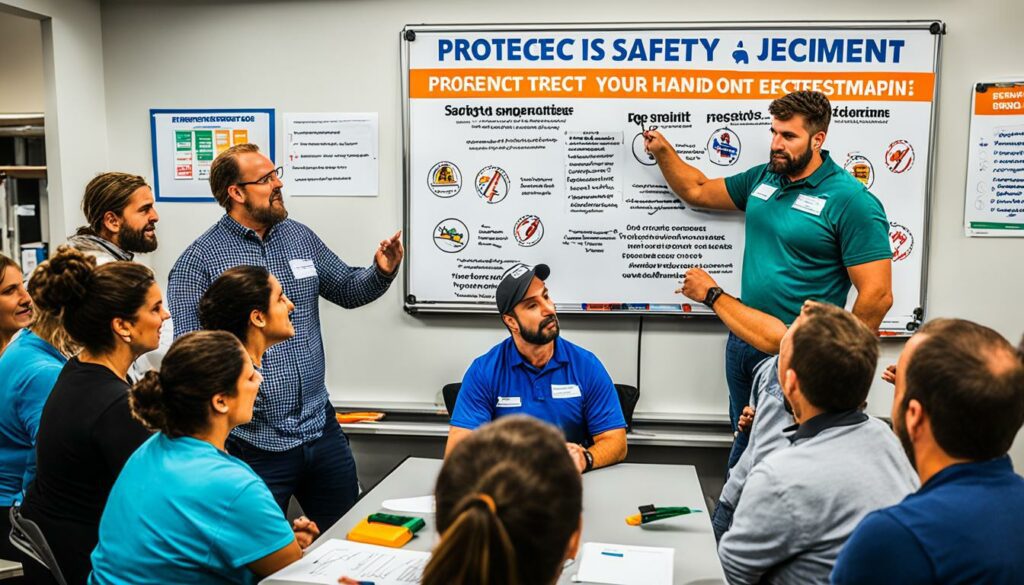
Picking accredited courses is important for quality and trust in safety standards. NYCAMH has courses like General Safety, Job-Specific, and Regulatory Compliance. These make sure people know the key safety rules, meeting top industry standards.
It’s vital the course matches what you face on the farm. NYCAMH’s farm safety workshops come in English and Spanish. They cover areas like physical dangers, handling chemicals safely, and how to protect against injuries. This makes the training fit each farm’s specific needs.
In the fast-changing farm world, keeping safety practices up-to-date is key. Farm workers learn in special safety programs to know the newest standards. This teaches them how to keep the farm safe. It’s all about being ready and lowering dangers on the farm.
Using the latest methods and tech is important in farm safety courses. Take the FarmResponse course, for example. It costs $150, lasts 3.5 hours, and earns you CE credits. These courses keep everyone, from workers to bosses, in the loop with what’s new. This keeps the whole farm safe, not just the workers.
Having regular safety refreshers is crucial for a safe farm. Quick training that focuses well, like tailgate sessions, is great. These should have 5 to 10 people and cover the latest safety news. Weekly meetings talking about recent accidents help everyone stay alert.Chatting about safety openly gets everyone on the same page. This builds a culture of shared responsibility. When everyone cares and knows what to do, accidents drop. Research from UW-Madison highlights the importance of keeping workers safe. This matches well with updated safety training goals.
| Programme | Duration | Cost | CE Credits | States with Scholarships |
|---|---|---|---|---|
| FarmResponse | 3.5 hours | $150 | 3.5 | Connecticut, Georgia, Guam, Hawaii, Iowa, Kansas, Louisiana, Minnesota, Missouri, Nebraska, North Dakota, Pennsylvania, South Dakota, Virginia, Washington, Wyoming |
Learning about farm safety never stops being important. By keeping training and practices current, we match the latest safety rules. This helps make farms all over safer places.
As we end our look at farm safety training, its vital role shines through. Studies like the Agricultural Health Study by Alavanja and others in 1996 show its benefits. Their work shows structured safety programs help farms a lot.
Also, the positive impacts are big. Donham and team in 2007 pointed out how bad injuries and illnesses are for farming. Training helps farms follow safety rules, cutting costs and boosting work.
By focusing on safety, we tell everyone it matters. This bond strengthens the farm’s name and trust with others. A safety-first culture, backed by trainings and rules, supports farmers’ and workers’ safety. So, using farm safety programs is key to a safe, productive farm life.
Farm safety training comes in many types. This includes on-site sessions, online classes, and workshops. Each type gives different benefits. They teach everything from how to use things safely to flexible studying.
Farm safety training is key to lowering deaths and bad injuries on farms. It helps in two big ways. First, it keeps farms running well and safely. Second, it cuts down on injuries and sickness from chemicals.
These courses cover using and handling machines safely. They teach tractor and heavy equipment safety. The goal is to avoid accidents and teach better ways to use these machines.
Training on safe farming involves lots of things. It includes teaching workers how to be safe in fields, with equipment, and following rules. This makes sure the farm is a safe and good place to work.
There are special courses for using pesticides and fertilisers safely. Workers learn about the dangers and how to stay safe. This stops pollution and keeps them healthy.
Yes, workshops fit different safety needs. They start with safety basics and go up to advanced systems. This helps all workers, no matter their skill level.
Rural safety training is crucial, especially for families. It protects kids working on farms. By including the whole family, everyone learns to keep the farm safe.
Certifications show farms are safe and follow rules. They prove the farm uses the best safety practices. This helps during checks and shows the farm is doing its best.
Farm safety projects like AgrAbility help disabled farmers. They offer bespoke checks and new tools. This support lets disabled farmers work as safely as possible.
Community projects unite farmers for a safer working environment. They offer local help and information. This helps make safety a real group effort in farming areas.
Distance learning lets farmers study safely from anywhere. It uses online courses for learning safety. This way, farmers worldwide can adopt safe practices better.
Choosing the right training is important. Always check for course quality and if it fits your farm’s needs. Good courses match safety standards and are helpful for your specific farm.
Learning often keeps farm safety top-notch. It includes updates and more training. This is important because farm safety rules and tools always change.